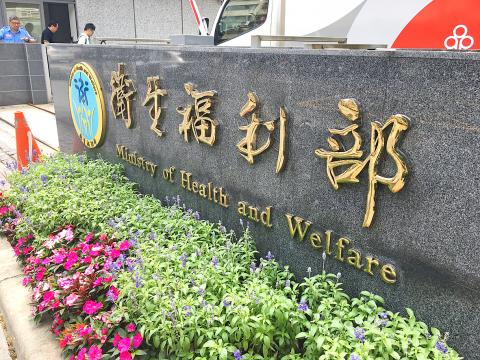More than a dozen computer system servers at hospitals have been attacked by ransomware, the Ministry of Health and Welfare said yesterday.
The ministry issued the statement after Chinese-language reports said that about 56 hospitals nationwide have been targeted by ransomware since Thursday, including ministry-affiliated hospitals, large regional hospitals and clinics.
Hackers used malware to block hospitals’ access to their own information system and asked them to pay in bitcoin within a certain time or face losing files, the reports said.

Photo: Lin Hui-chin, Taipei Times
The reports said that the ministry had reported the cases to the Ministry of Justice’s Investigation Bureau.
Department of Information Management Director Parng I-ming (龐一鳴) said that the ministry received information about a ransomware attack initiated early on Thursday at the ministry’s Taipei Hospital in New Taipei City.
However, the hospital restored the system within two hours and no medical records were leaked, Parng said.
About a dozen other hospitals reported ransomware attacks that were initiated early on Friday, he said, adding that the issues were resolved in one to two hours, no ransoms were paid and no patient information was compromised.
Similar incidents have occurred at hospitals in Taiwan before, with the source of the attacks tracked to eastern Europe, he said, adding that the sources of this week’s attacks have not yet been identified.
The hospitals had password management problems that could be improved, so the ministry has asked them to bolster their information security, he said.
A US survey showed that about one-quarter of ransomware cases targeted healthcare facilities, he added.
Additional reporting by CNA

Taiwan is stepping up plans to create self-sufficient supply chains for combat drones and increase foreign orders from the US to counter China’s numerical superiority, a defense official said on Saturday. Commenting on condition of anonymity, the official said the nation’s armed forces are in agreement with US Admiral Samuel Paparo’s assessment that Taiwan’s military must be prepared to turn the nation’s waters into a “hellscape” for the Chinese People’s Liberation Army (PLA). Paparo, the commander of the US Indo-Pacific Command, reiterated the concept during a Congressional hearing in Washington on Wednesday. He first coined the term in a security conference last

Prosecutors today declined to say who was questioned regarding alleged forgery on petitions to recall Democratic Progressive Party (DPP) legislators, after Chinese-language media earlier reported that members of the Chinese Nationalist Party (KMT) Youth League were brought in for questioning. The Ministry of Justice Investigation Bureau confirmed that two people had been questioned, but did not disclose any further information about the ongoing investigation. KMT Youth League members Lee Hsiao-liang (李孝亮) and Liu Szu-yin (劉思吟) — who are leading the effort to recall DPP caucus chief executive Rosalia Wu (吳思瑤) and Legislator Wu Pei-yi (吳沛憶) — both posted on Facebook saying: “I

Sung Chien-liang (宋建樑), who led efforts to recall Democratic Progressive Party (DPP) Legislator Lee Kun-cheng (李坤城), was released on bail of NT$80,000 today amid outcry over his decision to wear a Nazi armband to questioning the night before. Sung arrived at the New Taipei District Prosecutors’ Office for questioning in a recall petition forgery case last night wearing a red armband bearing a swastika, carrying a copy of Adolf Hitler’s Mein Kampf and giving a Nazi salute. Sung left the building at 1:15am without the armband and covering the book with his coat. Lee said today that this is a serious

A mountain blaze that broke out yesterday morning in Yangmingshan National Park was put out after five hours, following multi agency efforts involving dozens of fire trucks and helicopter water drops. The fire might have been sparked by an air quality sensor operated by the National Center for High-Performance Computing, one of the national-level laboratories under the National Applied Research Laboratories, Yangmingshan National Park Headquarters said. The Taipei City Fire Department said the fire, which broke out at about 11am yesterday near the mountainous Xiaoyoukeng (小油坑) Recreation Area was extinguished at 4:32pm. It had initially dispatched 72 personnel in four command vehicles, 16